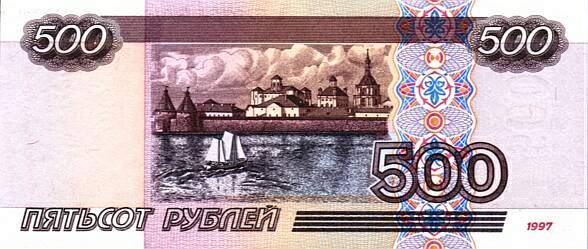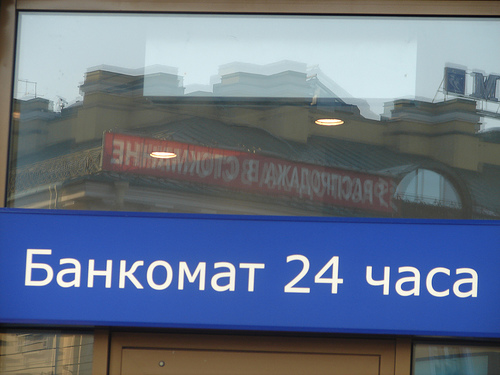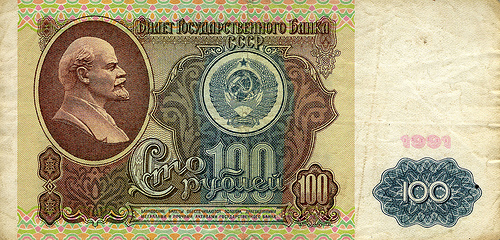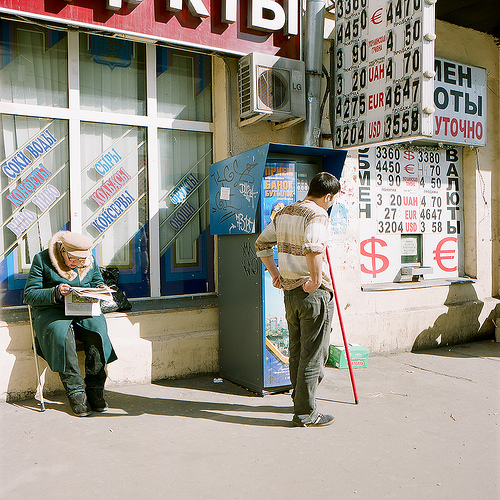Practical Advice on Money in Russia
Having said that, many Russians still have their savings in US dollars or Euro, partly because of the old tradition, partly because many get their salaries in foreign currencies, partly because they still don't trust in Ruble's stability, so you'll often find that you'll be able to pay to a private person with US dollars or Euro (depending which currency this person trusts better).
How to Keep Your Money - Cash, Travelers Cheques, Credit Cards in Russia
Cash. is used much more often than the cards, and if you're outside of the big cities, take cash only because it will be hard to cash the cards or cheques. It's better if the cash is in US dollars or Euros, because that's the currency you'll be able to change everywhere in Russia. Also Euro is strong at the moment, and many Russians are transfering their savings from Dollars to Euro, so you're likely to get a better exchange rate (see the current exchange rates in the right column of this page).
If you have any other currency, then it might be hard to find an exchange office, and the rate won't be in your favor. Better change your money in US dollars or Euro beforehand.
Also, the exchange rates of $ US and Euro to the Ruble is better in Moscow and St. Petersburg. If you change your money in Siberia, for example, you'll lose about 3%.

Travelers' Cheques is probably the most secure way of keeping your money: you are the only one who can cash the cheques and if lost they can be reissued - just write down the numbers beforehand and keep them separate from the cheques. The problem is that in Russia you can refund them only in banks, which are opened only from 9 until 17. The banks charge commission for refunding the cheques (about 2-3%) and for buying the cheques - usually 1%.
Please, note, that you cannot pay with travelers cheques in Russia, you can only withdraw money from them in banks.
Also, the recent customs regulations make it necessary to declare the cheques when you enter Russia.
Credit Cards. There're many cash machines in Moscow, St. Petersburg and major Siberian cities, and a lot of shops and restaurants accept cards in the big cities. However, as soon as you go to smaller towns, you'll find it hard to use your credit card.
If you don't know where to look for an ATM ("bankomat" in Russian), go to any big and expensive hotel. However, it's better if you withdraw your money in the cash machine, which is at some bank's office, in that case if your card gets swallowed you'll deal with the problem faster. See banks and cash machines (ATMs) addresses in Practicalities section of the city guides.
Usually banks charge 0 to 1% commission if you withdraw money with the card of the other (foreign) bank, but your bank - the issuer of the card - will take from $2 to $5 US for this operation. In most of the cases you'll receive rubles, some ATMs dispense rubles as well.
Visa, MasterCard are accepted almost in any ATM, Visa Electron and Cirrus / Maestro - more rarely, and AMEX and Diners Club owners might have problems cashing the cards.

an ATM sign in Russia / photo by quinnanya@flickR
Travelers' Cards are the plastic cards that are a mix of traveler's cheques and debit cards - you can cash them in the cash machines. Visa Travel Money traveler's card can be shared by many people (there can be many cards for one account) and if stolen it can be easily reissued. For more info go to http://www.visa.com/vtm/.
Visa Travel Money card works like this: you pay $5 US to open this card, put an one-time amount (you can't put more later), use all money on this card and then chuck it. This card can be used by anyone who knows the PIN, everytime you withdraw money, there's a comission of $5 US. The good thing about this card is that all money are on the Visa accounts, you can always phone Visa numbers to know how much money you have left on your account and in case you loose this card, it's easier to re-issue it (and it's only $5), and Visa cards are accepted almost everywhere.
Also this card might work well if you want to pay for something. Instead of writing a check, sending your credit card data etc., you can just go to any bank, buy this card for $5, put some money on it, send this card by post, send a PIN via email, a person receives this cards, receives the PIN, goes either to a bank or a cash machine and gets money. After this the card can't be used anymore.
Security & In Case of Emergency - What to Do if You Lost Your Card, Money, or Travelers' Cheques in Russia
From my personal experience, I know that it's better to divide the amount you have in three parts and store them separately. It's better if the three parts you have are all different: one-third of cash, one-third in travelers' cheques, one-third in travelers' cards.
If everything you had is stolen you can ask somebody to make a money transfer for you (through Western Union for example) to the bank you choose.
Otherwise you can go to your country's embassy and maybe they will help you.
In case your credit card or traveler's cheques are stolen or lost you should call the issuer of the card or cheque to block it. Below we provide emergency phone numbers in Moscow.
If everything you had is stolen you can ask somebody to make a money transfer for you (through Western Union for example) to the bank you choose.
Otherwise you can go to your country's embassy and maybe they will help you. Anyway, not to get in big trouble try to store some amounts in cheques and cards and put them all in different places, so that if something is stolen you still have a backup.
Lost & Stolen Credit Cards Emergency Numbers: AMEX offices in Moscow: (095) 933-6636 (from 9.00 to 17.00), and in St. Petersburg (812) 329-6060 (from 9.00 till 17.00). Amex, Visa, MasterCard, Diners', JCB cards center in Moscow: (495) 956-3556 (24 hours a day).
Average Prices in Russia
A taxi ride in Moscow or St. Petersburg: from center to suburbs - about $6 -$10 US, otherwise it's about $0.4 per kilometer and about 20% less in smaller towns.
A bed in a dorm room of a hostel: from $20
A *** hotel room: $80-$150
A ***** hotel room: >$250
Renting a western standard apartment: $90/day short term, $1000-$2500 long term (per month)
1 metro trip: $0.5, 1 bus trip: $0.4
A lunch in a restaurant (business hours) for 1 person $8 in Moscow, $3-$4 in other cities.
All you can eat: about $12 in Moscow
A nice dinner for two with wine: $60 US in Moscow, $35 in other cities
Entrance to a club $0 (the most), $2-$5 (if there's a special party), $2-$5 (if there's a concert), $10-$20 (if there's a famous foreign dj or a musician invited), $30-$50 (for posh places)
A beer in a club $1 in St. Petersburg and other Russian towns, $1.5-$2 in Moscow
A meal in a club $3-$7
A loaf of bread $0.4
A pack of milk: $0.5-$0.7
1 kg of bananas $0.8, 1 kg of apples $1.2, 1 kg of oranges $1-$1.5, 1 kg of tomatoes: $1, 1 kg of potatoes $0.4-$0.6
A pack of rice: $1, 1 kg of chicken filet: $3-$4, 1 kg of meat: $2-$5, 1 kg of fish filet $4.
A fine to a cop if you don't have a registration for your visa: $30
Where and How to Change your Money
Usually, there are no commissions if you change dollars to roubles, but if you do vice-versa, they'll charge you 1-2%. Always check how much you've got, while you are in front of the cashier.
Never change money on the street, because you might get defrauded. "Exchange office" in Russian language sounds "ob`men va`lyuty". Exchange offices at the airports and railway stations offer slightly lower exchange rate.
Money Transfer Services in Russia
Citizens of the United States, Canada, and some EU countries can make a Western Union transfer through the internet, using their credit card. See details on WU's website at http://www.westernunion.com/
Another relatively wide spread money-transfer system in Russian is MoneyGram (mostly in Moscow and St. Petersburg).
Both Western Union and MoneyGram charge quite much for their services, so you may consider using other cheaper options. Normally, they take longer, but commission is much lower.
There's also a local money transfer system called Contact. They seem to have very low commission (2-3%), but we've never used their services and their website looks a bit dodgy. But if you decide to go ahead, you can make a transfer from your credit card to any bank account in Russia using their system (http://www.contact-sys.com ).
For a list of foreign and Russian banks in Moscow, see Moscow Guide / Practicalities.



